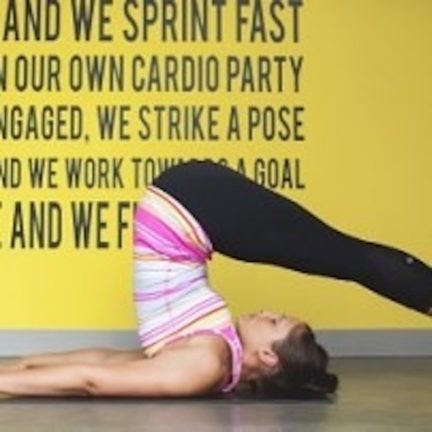How to Stop Comparing and Love Your Body

Have you ever found yourself looking through a magazine and agonizing over the fact that you will never look like a certain celebrity? What about looking at someone’s Facebook page and wishing you could be more like them, or at least get into their impressive yoga pose? I know I have.
It took me years to understand that comparing myself to others contributed to some major unhappiness. When you constantly compare yourself to others, you are almost always left with a feeling of inadequacy. In our Western culture, we are surrounded by reality TV and social media, which puts a huge pressure on us to be “perfect”.
One summer afternoon, at the age of six, while playing Barbies with my sister, I overheard our nanny telling her friend how perfectly proportioned Barbie’s body was. For the first time in my life, I gave the doll a second look. She does have perfectly long, slender legs and a super tiny waist, I thought to myself. I then went on with my afternoon of playing dolls, just as innocently as any six year old would do, and did not really give it a second thought.
FROM BARBIE TO BEYONCÉ
The next day, while running through the sprinklers, I felt my thighs touch. I suddenly felt a sense of disgust overtake me. My body was not perfect. I was flawed. Little did I know that this belief, I had developed about my body, would stick with me for years to come.
Throughout my grammar school years, I loved to look at the magazines in the grocery store check-out isles as my mom paid for the groceries. I distinctly remember noticing that none of the beautiful celebrities’ thighs even came close to touching. They had tiny waistlines and the most glamorous clothes. I loved studying their bodies, their clothes, hair and makeup. When I compared myself to them, in my mind, I was far from measuring up.
When I reached high school, a curvaceous new celebrity rolled onto the cover of the magazines that I so religiously studied. Her name was Beyoncé. She had radiant skin and hair and was practically worshiped on magazine covers for her curves. Rather than feel like it was finally okay to have curves, I instead felt a sense of confusion. The media was telling me it was okay to have curves, yet everywhere I looked they still showed only stick thin celebrities and models.
As a result of this confusion, I began to break away from what the world was telling me to look like. Today I accept that there is no such thing as “perfect”. What is “perfect” anyways? Is Barbie’s body perfect, is Beyoncé’s or is yours? When we feel good about ourselves and stop comparing ourselves to others, leading a healthy, happy life becomes much easier!
How to Weather an Existential Crisis

There comes a time in the lives of many when there is a pause to reflect on the meaning of life. When this moment of Zen turns out to be especially troubling, puzzling, or even discombobulating, we have a name for it — an existential crisis. The symptoms of an existential crisis range from mild wonderment to turning your world on its head and it can feel much more extreme than a prolonged state of confusion or mental health issue.
There are numerous introductions into the potential rabbit hole of an existential crisis, but all of them usually begin with the question “Why am I here?” or “What is the meaning of life?” If you’re going through this, you aren’t alone.
Philosophers have contemplated the purpose of existence and existential anxiety all the way back through our collective past. Socrates had a prescription: “Know thyself.” The Indian sage Ramana Maharshi suggested asking, “Who am I?”
Why do we humans get caught up in this search for meaning, and why do we fear a meaningless life? Better yet, is there any meaning at all? Some people suggest there is a purpose to life that is bound to a sense of well-being, but the masters of enlightenment have long said that we are looking in the wrong direction — outward instead of inward.
Joseph Campbell taught that it’s better to stop searching for the meaning of life and to begin looking for the meaning in life. In other words, life deals us a certain hand of cards, and we need to find what makes us passionate about them. Campbell summed this up in three immortal words: “Follow your bliss” — and the philosopher Soren Kierkegaard said, “Don’t forget to love yourself.”






































